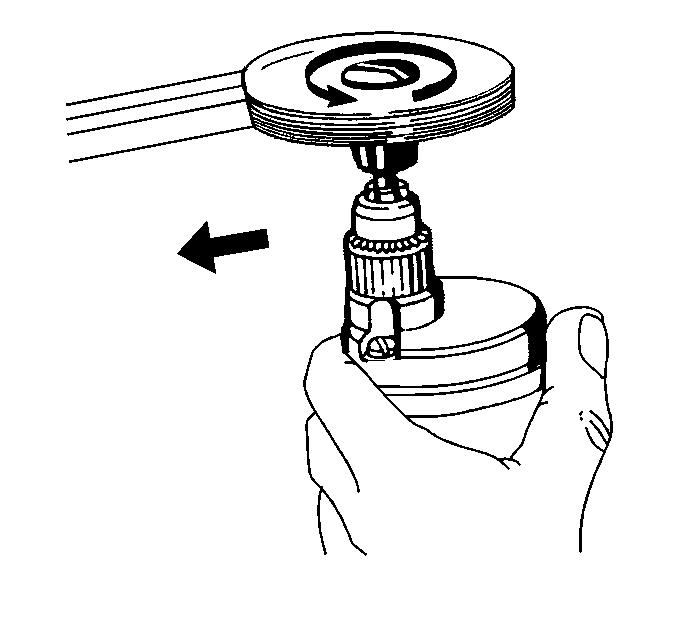Stripes or Decals
The stripes and decals adhere to a painted surface using pressure sensitive
adhesive.
The use of a wetting solution aids the technician in lifting and positioning
the stripe or decal during the installation. The wetting solution ensures
a better bond between the stripe or decal and the panel assembly. Use
a wetting solution when applying large stripe and decal packages.
Complete the following procedures before you apply a stripe or a decal:
| • | Metal repair or refinishing after a collision |
| • | Painting the underlying surface |
Maintain a temperature 21°-38° C (70°-100° F)
on the body surfaces and the decals prior to installation. The decal requires
auxiliary heat sources in order to warm the body surfaces and decals. If
the temperature is below 21° C (70° F) the decal may
not adhere to the body surface properly.
Important: You may apply stripes or decals using the dry method. Use the wet method
if the dry method does not result in a bubble free application. This may be
the case in large graphics packages.
Use the wet method in order to apply the stripes or decals that are
applied on flexible surfaces (fascias, etc.). This will reduce the formation
of bubbles under the decal due to the outgassing potential of the flexible
materials.
Use the following equipment and materials in order to apply a stripe
or a decal:
| | A foaming type of window cleaner that does not contain ammonia. |
| • | A silicone, wax and grease remover |
| • | Varnish Makers and Painters (VM&P) naptha |
| - | 75-100 mm (3-4 in) wide. |
| - | Made of plastic or hard rubber. |
| - | Deburr any sharp or rough edges in order to prevent scratching of the
stripe or decal. |
| • | A water bucket and sponge or spray bottle |
| • | A heat gun or heat lamp |
| • | A clean, lint-free wiping cloth |
| • | A sharp knife or razor blade |
Stripe or Decal Removal
- Remove the following components:
| • | Necessary moldings or trim panel |
| • | Molding attaching clips |
| • | Other stripe or decal overlapping parts |
- Clean the following areas as needed:

- Use 3M Scotch Brite molding adhesive remover disk 3M P/N 07501
or equivalent in order to remove the stripe or decal from the body panel.
- Use Varnish Makers and Painters (VM&P) naptha in order to
remove all traces of adhesive residue from the painted surfaces.
Stripe or Decal Installation -- Wet Method
- Prepare the surface.
Important: Remove any imperfections that would appear through the stripe or decal
if the area has been refinished.
- Clean the painted surface using the following types of removers:
- Clean the area where the stripe or decal will be applied using
a 50-50 mixture of isopropyl alcohol and water.
- Wipe the panel surface using a clean cloth while the solvent is
still wet. Allow the panel surface to dry.
- Apply the wetting solution to the area where you are installing
the stripe or decal.
Application of a soapy wetting solution on the top side of the stripe
or decal will ease the pull of the squeegee on the stripe or decal and help
to eliminate damage.
Important: Do not touch the adhesive backing of the stripes.
- Apply the wetting solution on the adhesive side of the stripe or decal.
Remove the backing material of the stripe or the decal as needed.
- Apply the strip or decal to the panel. The wetting solution will
allow movement for proper positioning on the panel surface.
- Working from the center where possible, squeegee the stripe or
decal into position. Apply additional wetting solution as needed in order
to ease installation.
- Apply heat to the stripe or decal at the recessed areas. Press
the stripe or decal into the recess in order to obtain a firm bond.
- Use adequate light reflection in order to inspect the stripe or
decal from a critical angle. This technique detects any irregularities that
may have developed during the installation.
Important: Do not use a razor blade or a knife edge in order to pierce the air
bubbles.
- Remove all air bubbles by piercing the bubble with one of the following
items:
| • | A tool with the same size piercing tip |
- Pierce the bubble on the outer edge. Force the air out through
the opposite edge using the blade of the squeegee.
- Install any previously removed components. Clean the components
as needed.

